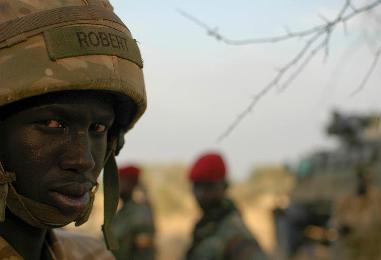South Sudan rivals to command separate armies during transitional period
November 8, 2014 (ADDIS ABABA) – Rival factional leaders in South Sudan have agreed to command separate forces in the would-be government of national unity during a transitional period in a bid to end the 11-month old civil war in the young country.

Opposition leader’s spokesman, James Gatdet Dak, has confirmed to Sudan Tribune on Saturday that the president and the prime minister will command separate forces of the government and rebels, respectively.
“Yes, it is agreed that the president shall be the commander-in-chief of the armed forces currently in government and the prime minister shall be the commander-in-chief of the resistance army, SPLM/SPLA,” Dak explained.
He said the separate commands per the draft agreement sanctioned by IGAD will continue or come into effect from the pre-transitional period into the transitional period until the integration process of the two armies is completed.
Dak however added that mechanisms for integrating the two forces as well as their territories of control, provision of services and functions are yet to be worked out in the security arrangements.
Even though the two principals failed to strike a deal and provide a breakthrough, IGAD officials praised them for agreeing on most of the draft agreement on power-sharing arrangements.
Proponents of the deal said the separate armies would address concerns particularly among the supporters of the rebel group and serve as a confidence building measure during the transitional period.
Observers however fear that the arrangement would be a recipe for another disaster with more devastating consequences should there be a serious disagreement between the two principals in the course of implementation of the would-be peace agreement.
OTHER AREAS OF AGREEMENT
In the draft document seen by Sudan Tribune, the two principals also agreed that the president shall chair the council of ministers, but may delegate it to the prime minister.
The president shall also appoint ministers and presidential advisors “in consultation with and consent of the prime minister in accordance with the peace agreement.”
He shall also chair both the national defence council and the national security council, but to be deputised by the prime minister.
The president shall also direct and supervise foreign policies and ratify international agreements with the approval of the national legislative assembly.
On the other hand, the prime minister shall direct the work of government and oversee preparation and consideration of government business and programs.
The prime minister shall also be in charge of coordination of the implementation of the peace agreement and institutional reforms.
He shall also appoint undersecretaries of the ministries as well as head of public corporations and executive directors of commission, senior civil servants under the undersecretaries, and will ensure implementation of resolutions of the cabinet by relevant ministries, chair cabinet sub-committees as well as present government’s programs and budget to the national parliament.
JOINT EXECUTIVE FUNCTIONS
The draft agreement also outlined what it said are joint functions between the president and the prime minister, suggesting the two principles will exercise a joint power to appoint constitutional post holders including state governors, ambassadors and remove governor or dissolve a legislative assembly in an event of a crisis and declare war, among others.
AREAS OF DISAGREEMENT
The main area of disagreement is the leadership structure during the transitional period. While the government wanted positions of vice-president and two deputies to the prime minister.
The opposition group wanted the leadership structure to be the president and the prime minister.
In an event that the two principals seal the deal on the leadership structure and the power-sharing, the parties would then continue to negotiate on the system of governance, security arrangements, reforms as well as issues of accountability and reconciliation.
Meanwhile regional leaders at the summit on Friday gave the two principles 15 days to consult with their constituencies and finalise an agreement on the topic of the leadership structure and power-sharing.
In a resolution passed on Friday, IGAD leaders have threatened the two warring factions with direct regional military intervention and targeted sanctions that would include freezing of individual’s assets, travel ban in the region as well as arms embargo.
(ST)
Related story
South Sudanese factions given 15 more days to reach an agreement
